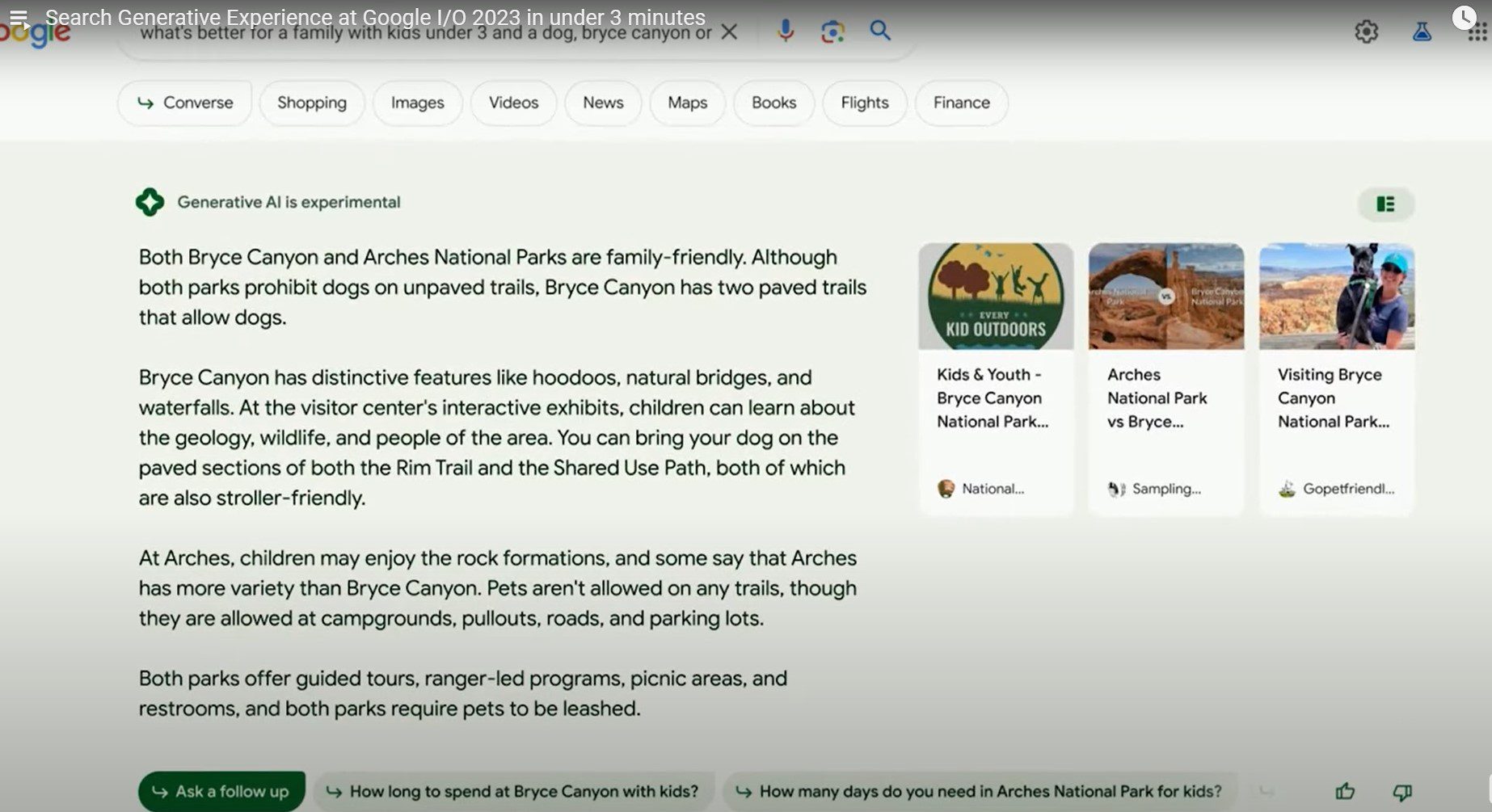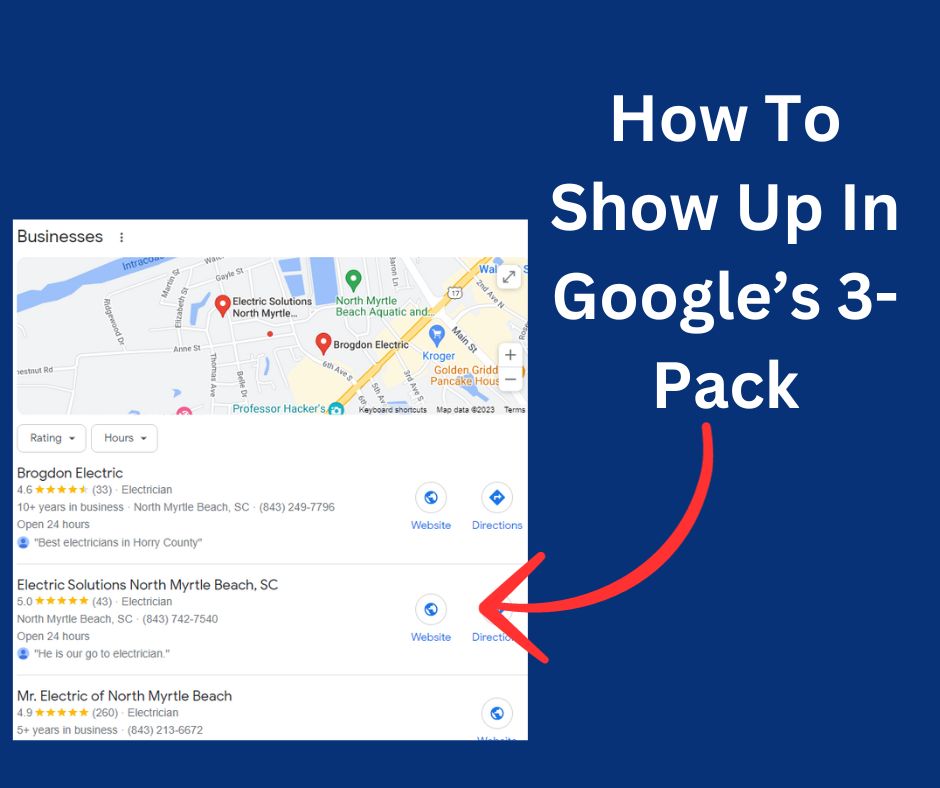This Is A Game Changer!
Google has been at the forefront of search engine technology for many years, constantly improving its algorithms to provide the most relevant and useful results to users. According to Statista, Google accounts for over 92 percent of the global search engine market share.
Most of Google’s revenue is from search-related activities. According to Statista, Google earned over $224 billion USD (almost 80% of revenues) in advertising revenue from search in 2022, which accounted for 86% of their total ad revenue.
Google Introduces Bard AI
The Google search ranking paradigm has more than 200 algorithms that are constantly being updated and tweaked to ensure users get the best possible result when searching for something on the web. But now, Google is using Artificial Intelligence (AI) in its search engine results page (SERP). The new AI-based system, called BARD AI, stands for “Bidirectional Attention Relevance Diffusion” and it will be used to generate better search results.
When someone searches with Google, BARD AI will be able to look at different factors such as user intent and context, previous searches, and other data points to determine the most relevant pages for a query. It also uses natural language processing techniques to understand what the searcher is looking for and can generate results more quickly than other search engines.
Questions Not Keywords
One of the most significant changes that Bard AI will bring to search engine results pages (SERP) is the shift towards more natural language queries. Instead of using simple keywords, users will be able to ask questions in a more conversational manner, providing Bard AI with more context to understand their intent. This means that websites that optimize their content for natural language queries will be more likely to appear in the top results.
The goal of this system is for users to be able to type in a more conversational query and get precise results without having to use special keywords or complicated search parameters. For example, instead of typing in “restaurants near me,” a user could simply ask “Where can I find a good restaurant?” and be directed to the most relevant places.
Another important aspect of Bard AI is its ability to generate rich snippets, which are brief summaries of information that appear beneath search results. These snippets can include images, links, and even videos, providing users with a more engaging and visually appealing experience. Websites that include structured data in their content will be more likely to appear in these rich snippets, increasing their visibility and click-through rates.

Personalized Search Experience
BARD AI will also be able to personalize the experience for each user by learning from their prior searches and providing them with more relevant content. This means that users could potentially get more accurate and personalized answers to their queries, leading to better overall search engine results.
Bard Promises To Revolutionize SERP

Using BARD AI, Google is moving away from traditional algorithms-based search towards a machine-learning-powered solution that provides a much richer experience for searchers while still maintaining the same level of accuracy expected of Google’s current algorithms. With this new technology, Google is aiming to provide even better results for its users in the near future.
Overall, Google’s BARD AI promises to revolutionize the SERP experience. With its ability to quickly process natural language queries and generate more relevant results based on user intent, BARD AI could be a game changer in the way people search online.
Will Bard AI Kill SEO?
The answer is no. With over 80% of revenues coming from searches, Google is clearly not going to kill its golden goose. While the SEO landscape will likely change with this new AI technology, it will also open up new opportunities for website owners to optimize their content and get better search results. Thus, SEOs need to stay alert and adjust their strategies accordingly.
Google’s BARD AI technology is already being used in some parts of Google’s search engine and is expected to become more widely available soon. As the technology gets better, it will revolutionize the way we search online.
Bard AI will also provide more personalized results based on a user’s search history and preferences. This means that websites that cater to specific niches or audiences will be more likely to appear in the top results for those users. For example, if a user frequently searches for vegan recipes, Bard AI will prioritize websites that specialize in vegan cuisine.
Finally, Bard AI will improve the accuracy of voice search results, which are becoming increasingly popular as more users use voice assistants like Google Assistant and Alexa. By understanding the context of a user’s query, Bard AI will be able to provide more accurate and relevant responses to voice queries, making voice search a more viable option for users.
How will Bard affect website traffic?
The introduction of Bard AI will have a significant impact on organic search traffic. Providing more accurate and personalized results, it will encourage users to click through to the most relevant websites. Websites that optimize their content for natural language queries and structured data will be more likely to appear in the top search results, resulting in an increase in organic traffic. Additionally, by offering rich snippets and voice search results, Bard AI has the potential to drive even more website visits over time.
Conclusion
In conclusion, Bard AI is set to change the way search engine results are presented, making them more conversational, personalized, and visually engaging. Websites that optimize their content for natural language queries, include structured data and cater to specific niches or audiences will be more likely to appear in the top results. As search engine technology continues to evolve, it is crucial for businesses to stay up-to-date with the latest developments and adapt their SEO strategies accordingly.
Built On LaMDA
BARD AI is built on Google’s Lambda Cloud and is a great example of the potential that can be achieved with this technology. BARD AI allows developers to quickly develop powerful AI solutions for natural language understanding, machine translation, summarization, and more. Developers can use BARD AI to build advanced applications with improved language understanding capabilities.
Google’s Lambda cloud is a new type of cloud-based technology developed by Google that combines two distinct machine learning algorithms, known as LaMDA (Language Modeling with Disentangled Attention) and seq2seq (Seq2Seq Recurrent Neural Network).
The LaMDA algorithm focuses on language modeling and enables machines to understand natural language. This means that machines can better interpret the meaning of words and phrases. Using this algorithm, developers can create systems for natural language understanding, such as chatbots and BRAD applications or digital assistants.
The seq2seq algorithm focuses on translating one sentence into another in any given language. It is especially useful for tasks such as machine translation, question answering, summarization, and natural language processing. As an example, seq2seq can be used to translate from English to Spanish or vice versa by teaching a machine to understand the meaning of words in both languages at once.
Together, these two algorithms create a powerful tool for developers looking to create more advanced applications with improved natural language understanding capabilities. With Lambda Cloud, developers can take advantage of both LaMDA and seq2seq for creating solutions that are applicable in multiple industries such as healthcare, finance, retail, and travel.
Google’s Lambda cloud is a new type of cloud-based technology developed by Google that combines two distinct machine learning algorithms, known as LaMDA (Language Modeling with Disentangled Attention) and seq2seq (Seq2Seq Recurrent Neural Network).
The LaMDA algorithm focuses on language modeling and enables machines to understand natural language. This means that machines can better interpret the meaning of words and phrases. Using this algorithm, developers can create systems for natural language understanding, such as chatbot and BRAD applications or digital assistants.
The seq2seq algorithm focuses on translating one sentence into another in any given language. It is especially useful for tasks such as machine translation, question answering, summarization, and natural language processing. As an example, seq2seq can be used to translate from English to Spanish or vice versa by teaching a machine to understand the meaning of words in both languages at once.
Together, these two algorithms create a powerful tool for developers looking to create more advanced applications with improved natural language understanding capabilities. With Lambda Cloud, developers can take advantage of both LaMDA and seq2seq for creating solutions that are applicable in multiple industries such as healthcare, finance, retail, and travel.
Will Google release LAMBA to the public?
Google has not yet released Lambda Cloud to the public and there is no official timeline for when this will happen. However, Google is actively working on expanding access to the technology via a variety of options such as open-source libraries and cloud-based services. Developers can check out Google’s AI Platform page for updates on the availability of Lambda Cloud.
Stay tuned!






